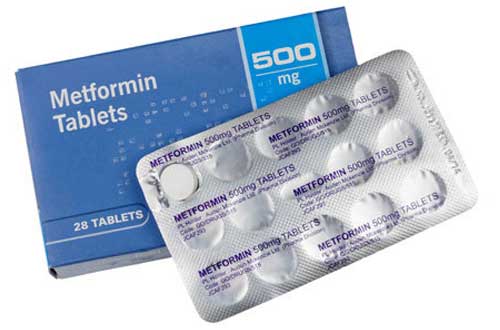

Buy Metformin Online
Metformin 850, 500 mg
$0.24 Per pill
Active Ingredient: metformin. Metformin is used for treating type 2 diabetes.

Metformin is sold in the United States under the name Glucophage. It was approved by the Food and Drug Administration (FDA) in 1995 for use in combination with diet and exercise to control blood sugar in adults and children with type 2 diabetes. It is the only FDA-approved drug that belongs to the biguanide family of drugs — a group of oral type 2 diabetes drugs that work by preventing the production of glucose by the liver, improving the body’s sensitivity towards insulin and reducing the amount of sugar absorbed by the intestines. Metformin is the drug of choice for initial treatment of patients with type 2 diabetes who are not able to control their blood sugar through diet and exercise alone and who do not have severe kidney impairment. One of the most effective drugs for lowering blood sugar, metformin does not cause weight gain, rarely causes hypoglycemia, has few adverse effects and is available in generic versions at low cost.
Metformin
Before you buy Metformin, make sure your doctor does a blood test to measure your kidney function. If you have advanced moderate or severe kidney impairment, you should not start taking metformin. When using metformin, your doctor should check your kidney function periodically. If you develop severe kidney impairment while taking the drug, you should be switched to another diabetes drug, such as a second or third generation sulfonylurea or insulin. Metformin is effective when used with other glucose-lowering drugs.

For patients who fail to achieve adequate lowering of their blood hemoglobin A1c level (a measure of blood sugar control over the preceding two to three months) with metformin alone, adding a second- or third-generation sulfonylurea, such as glyburide or glipizide, may be appropriate. Metformin can cause lactic acidosis (a buildup of lactic acid in the blood) and should not be used in patients with severe kidney impairment because they are at greatest risk for this rare but potentially fatal adverse reaction. Over the past two decades, many fixed-dose combination medications containing metformin and another oral diabetes drug have been marketed in the U.S.
Metformin (Glucophage) 500 mg Prices
The cost for Glucophage oral tablet 500 mg is around $12 for a supply of 10 tablets, depending on the pharmacy you visit. This Glucophage price review is based on most USA pharmacies offers. Also, you can buy generic Metformin as the same medicine, but at much lower price.
Metformin Coupons and Rebates
Metformin offers may be in the form of a printable coupon, rebate, savings card, trial offer, or free samples. Some offers may be printed right from a website, others require registration, completing a questionnaire, or obtaining a sample from the doctor's office.
Savings Options
Finding less expensive alternatives to meds purchases can be one of the easiest ways to save. The biggest difference between brand name and generic items is marketing budgets, not ingredients. Generic products essentially are not manufactured by well-known companies, but commonly have the same chemical composition as well-known brands. Over-the-counter generic options are also just as effective as brand name OTC medications. A study by the University of Chicago found that doctors and pharmacists almost always purchased the generic version when buying for themselves. Much like the manufacturers of baking supplies and spices, the FDA also holds medication manufacturers to high standards.
Facts About This Drug
Metformin may be used to treat Type 2 diabetes. It increases the ability of cells to uptake glucose by improving their sensitivity to insulin. It also decreases the amount of glucose made by the liver and decreases the absorption of glucose from the intestine. Metformin belongs to the class of drugs known as biguanides. Other Metformin brand names: Fortamet, Glucophage XR, Glumetza, Riomet.

The Prospective Diabetes Study, which was published in The Lancet, included a randomized clinical trial that compared use of metformin with conventional treatment (primarily diet alone) in more than 750 overweight subjects with newly diagnosed type 2 diabetes. The researchers found that metformin treatment resulted in improved survival and a reduction in cardiovascular complications. Specifically, after an average follow-up of more than 10 years, subjects in the metformin group had a 35% lower risk of death from any cause than did subjects in the diet group. Subjects receiving metformin also had a 30% lower risk of adverse cardiovascular events (heart attack, sudden death, chest pain from coronary artery disease, stroke and peripheral vascular disease) than did those in the diet group.
A retrospective cohort study from the USA found a lower rate of hospitalisations for myocardial infarction and stroke and a reduced death rate when metformin was used first-line in type 2 diabetes in comparison with a sulfonylurea.
How is Metformin taken?
Type II diabetes affects between 15 to 20 million Americans. About 70% of type 2 diabetics will die from a cardiovascular-related disease. Conventional doctors often prescribe drugs for the purpose of lowering blood sugar levels. Metformin, if not contraindicated, should be considered first line-therapy for the management of type 2 diabetes mellitus.
Immediate-release: Take in divided doses 2 to 3 times a day with meals; titrate slowly to minimis gastrointestinal side effects. In general, significant responses are not observed with doses less than 1500 mg/day and doses above 2000 mg are generally associated with little additional efficacy and poorer tolerability.
Extended-release (ER): Take with the evening meal; if glycemic control is not achieved with ER 2000 mg once a day, may consider splitting daily dose to ER 1000 mg twice a day; if glycemic control is still not achieve, consider switch to immediate-release product.
Administration advice: Take orally with meals. Gastrointestinal tolerability may be improved by slowly increasing dose; doses above 2000 mg per day may be better tolerated given 3 times a day with meals.
Extended-release (ER): Take with evening meal. ER tablets: Swallow whole; do not crush, cut, dissolve, or chew. ER oral suspension: Measure dose in supplied dose cup; shake bottle well for at least 10 seconds before each use.
Use: To improve glycemic control in adults with type 2 diabetes mellitus as an adjunct to diet and exercise.
Metformin Dosage
Detailed Metformin dosage information for adults and children. Includes dosages for Diabetes Type 2.
Usual Adult Dose
Immediate-release:
Initial dose: 500 mg orally twice a day or 850 mg orally once a day.
Dose titration: Increase in 500 mg increments weekly or 850 mg every 2 weeks as tolerated.
Maintenance dose: 2000 mg/day in divided doses.
Maximum dose: 2550 mg/day.
Extended-release:
Initial dose: 500 to 1000 mg orally once a day.
Dose titration: Increase in 500 mg increments weekly as tolerated.
Maximum dose: 2000 mg/day.
Switching to Extended-Release:
Patients receiving immediate-release may switch to extended-release once a day at same total daily dose (up to 2000 mg/day).
Usual Pediatric Dose
10 years or older:
Immediate-release:
Initial dose: 500 mg orally twice a day.
Dose titration: Increase in 500 mg increments weekly as tolerated; daily dose should be taken in divided doses 2 to 3 times a day with meals.
Maximum dose: 2000 mg/day.
Extended-release oral suspension:
Initial dose: 500 mg orally once a day with evening meal.
Dose titration: Increase in 500 mg increments weekly based on glycemic control and tolerability.
Maximum dose: 2000 mg/day.
If patients do not respond to therapy after 3 to 4 months, consider intensifying treatment as outlined in accepted diabetes management algorithms and diabetes standards of care.
Side effects
Although recommended as the first-choice drug among all oral diabetes drugs, metformin very rarely can cause lactic acidosis, which is estimated to be fatal in about 50% of cases. The increased risk of lactic acidosis is the reason that the FDA required a black-box warning — the strongest type of warning that the FDA can require — in the drug’s product labeling.
Metformin should never be taken by patients with severe kidney impairment because they are at greatest risk of this adverse effect. The drug also should be avoided in patients with liver disease and used with caution in patients with any other risk factors for metformin-associated lactic acidosis, including heart failure.

The FDA initially required that the product labeling warn against the use of metformin in patients with any degree of kidney impairment. However, later, the agency announced that it had concluded that metformin can be used safely in patients with mild kidney impairment and in some patients with moderate kidney impairment. Therefore, the agency required changes to the product labeling for metformin to reflect this conclusion.
Metformin also can reduce the intestinal absorption of vitamin B12 from ingested food. Long-term use of metformin may result in vitamin B12 deficiency, which can lead to anemia and neurologic symptoms, including problems with cognitive function.
In 2017, the FDA updated the product label for metformin to indicate that liver injury has been reported with metformin use.
Do not use except in special situations if you have or have had:
- severe burns
- dehydration
- diabetic coma
- diabetic ketoacidosis
- hyperosmolar nonketotic coma
- severe infection
- major surgery
- severe trauma
- cardiorespiratory insufficiency
- cardiovascular collapse
- congestive heart failure
- heart attack
- liver disease
- lactic acidosis
- kidney disease or poor kidney function
- diagnostic or medical procedures using IV contrast media containing iodine
Tell your doctor if you have or have had:
- allergies to drugs
- pregnancy or are breast-feeding
- diarrhea
- gastroparesis
- intestinal blockage
- vomiting
- conditions causing delayed food absorption
- female hormonal changes
- high fever
- high levels of cortisol
- hyperthyroidism
- adrenal insufficiency
- pituitary insufficiency
- hypothyroidism
Tell your doctor about any other drugs you take, including aspirin, herbs, vitamins and other nonprescription drugs.
Interactions with Other Drugs
The following drugs, biologics (e.g., vaccines, therapeutic antibodies), or foods are listed in Evaluations of Drug Interactions as causing "highly clinically significant" or "clinically significant" interactions when used together with any of the drugs in this section. In some sections with multiple drugs, the interaction may have been reported for one but not all drugs in this section, but we include the interaction because the drugs in this section are similar to one another. We have also included potentially serious interactions listed in the drug’s FDA-approved professional package insert or in published medical journal articles. There may be other drugs, especially those in the families of drugs listed below, that also will react with this drug to cause severe adverse effects. Make sure to tell your doctor and pharmacist the drugs you are taking and tell them if you are taking any of these interacting drugs:
Metformin should be temporarily discontinued if you are undergoing a radiologic procedure that requires the use of an intravenous contrast product containing iodine. The thiazide diuretics, or water pills, interact with metformin. Other drugs that interact with metformin are: Acetophenazine, Acth, Adderal, Advir, Aerobid, Albuterol, Alupent, Amiloride, Amlodipine, Aramine, Armour Thyroid, Bactrim.
Contraindications:
Hypersensitivity to active substance.
Severe renal impairment.
Acute or chronic metabolic acidosis, including diabetic ketoacidosis, with or without coma.
According to the product information, metformin is contraindicated in patients with a creatinine clearance less than 60 mL/min, moderate–severe heart failure, acute myocardial infarction, and those undergoing major surgery.
Consult warnings section for additional precautions. Metformin can be continued despite some of the contraindications in the product information if the dose is reduced in appropriate patients and stopped at the time of acute illness.
Precautions
Metformin can cause lactic acidosis (a buildup of lactic acid in the blood), which can cause hypothermia (low body temperature), hypotension (low blood pressure), an abnormally slow heart rate and death. The onset of metformin-associated lactic acidosis is often subtle, accompanied only by nonspecific symptoms such as malaise (a general feeling of discomfort or being unwell), muscle aches, difficulty breathing, sleepiness and abdominal pain. This condition is diagnosed by blood tests, including a high blood lactate level.
Risk factors for metformin-associated lactic acidosis include kidney impairment, concomitant use of certain drugs (for example, carbonic anhydrase inhibitors such as topiramate), age 65 years old or older, having a radiological study with intravenous contrast, surgery and other procedures, conditions that cause low blood oxygen levels (for example, acute congestive heart failure), excessive alcohol intake and impaired liver function.
In patients suspected of having metformin-associated lactic acidosis, the drug should be immediately discontinued and general supportive measures should be instituted in a hospital setting. Prompt hemodialysis treatment also is recommended.
Metformin and hypoglycemia
Millions of prescriptions are filled each year for oral diabetes medications such as Metformin. But what patients might not know is that many other commonly used medications may affect a patient’s response to oral diabetes drugs, sometimes with dangerous results. With any of these diabetes drugs, using another drug that inhibits the metabolizing enzyme for your diabetes drug may increase the risk of hypoglycemia. Some diabetes drugs are not metabolized by liver enzymes and thus would not undergo the kinds of drug interactions described here.

For example, diabetes drugs eliminated primarily by the kidneys rather than by undergoing metabolism in the liver include the drug metformin (Glucophage). However, because these drugs are excreted by the kidneys, patients taking them may be vulnerable to interactions with drugs that affect the kidneys. People who take oral diabetes drugs should be alert for the effects of other drugs on their blood sugar. Make sure that the person who prescribed Metformin knows all the medications you are taking (including nonprescription drugs and over-the-counter products). This is especially important when starting any new medications, because hypoglycemia is more likely during the initiation of the interacting drug. If you are monitoring your own blood sugar levels, look for changes whenever you start or stop any other drug. Make sure you are aware of the symptoms of hypoglycemia to increase your chances of detecting it before it gets too severe.
Benefits
This drug counteracts many of the underlying factors that result in the manifestation of this insidious disease. Metformin also produces helpful side benefits that can protect against the lethal complications of type 2 diabetes.

Most helpful Metformin benefits:
- Metformin is the preferred therapy for people with Type 2 diabetes without any contraindications. It may be used in combination with other medications for Type 2 diabetes.
- May be used off-label (not an FDA-approved use, but still a recognized use of the drug) in polycystic ovary syndrome. Metformin decreases androgen hormone levels, improves menstrual cycles, ovulation regularity, and insulin sensitivity.
- Metformin rarely produces hypoglycemia (low blood sugar levels).
- Metformin does not change how much insulin is secreted and it does not cause hyperinsulinemia (high insulin levels). Fasting insulin levels and the base-line insulin response may actually decrease.
- Metformin has a unique mechanism of action and is like no other drug used for diabetes.
- Less likely to increase body weight (in fact body weight may decrease while on metformin), in contrast to many other medications used for diabetes, including sulfonylureas and insulin.
- May be used in children older than ten years.
- Generic metformin is available.
Another report looking at the results of sleep studies suggested that people with diabetes who take metformin had better sleep, or if they had evidence of sleep apnea, it appeared to be less severe. And there is even evidence that metformin might be good for bone density, with a positive effect on specific cells involved in bone formation. Recent studies have examined whether the use of metformin in those with kidney disease may be much safer than originally thought. Similarly, in people who have a chronic condition such as congestive heart failure, there is accumulating evidence that metformin again might be much safer than researchers initially theorized.
Most drugs do not adequately address the multiple underlying pathologies associated with the type 2 diabetic state. An ideal anti-diabetic drug would enhance cellular insulin sensitivity, inhibit excess intestinal absorption of sugar, reduce excess liver production of glucose, promote weight loss and reduce cardiovascular risk factors. Metformin (Glucophage) is the one drug that does all of this and more.
Metformin's multiple effects benefit individuals with a propensity to develop diabetes, cardiovascular problems, endocrine problems, retinopathies, nephropathies, cancer or decreased immunity, infections and weight gain.
As with diabetes, metformin has been shown to cause a reduction in appetite, weight, and the body's total fat content.
Metformin reduces or lowers the chances of developing atherosclerosis and reduces the rate of pro-aging cross linkages of collagen, which plays a role in the scar tissue build-up that occurs during wound healing.
Metformin prevents the acceleration of atherosclerosis and reduces the rate of pro-aging cross linking of collagen. The microvascular complications of hyperinsulinemia are improved by metformin due to the arterial clearance in small blood vessels of the eyes, kidneys and nerves.
There are other positive effects associated with metformin: decreased tumor growth and improved cellular immunity in individuals who are prone to chronic infections associated high blood sugar levels. In non diabetics, metformin reduced low density lipid, total cholesterol, free fatty acids, tissue plasminogen activator antigen, blood pressure and fasting triglyceride levels.
Women suffering from polycystic ovary syndrome have been treated with metformin. Benefits include: lipid lowering effects, reduction in systolic blood pressure, hyperinsulinemia and insulin resistance syndrome. Metformin has also been shown to aid in normal menstrual regulation and pregnancy.
In conclusion, the scientific research points to metformin's multiple uses, with few drawbacks. Accordingly, the drug's numerous side benefits associated with the treatment and prevention of diabetes, as well as other disorders, appear to outweigh its limited side effects.
Can i Buy Metformin Tablets Online?
You can buy Low cost Glucophage (Metformin) tablets online from registered online pharmacy and doctor service. The doctors at online pharmacy can prescribe Metformin for those who have been diagnosed with diabetes and previously been prescribed the treatment. You can buy Metformin online after an easy and free consultation. This is used by doctors, to gauge your suitability for the treatment in terms of safety and effectiveness. If you are approved, they will then dispense your medication and deliver it straight to your preferred address. But it is still important to use your GP to get your diabetes medication regularly, and to have regular check ups with your GP or nurse, so they can check that your condition is stable. Usually, available strengths of Metformin are: Metformin 500mg and Metformin 850mg. Try to find pharmacy with no prescription fees, and no delivery charges on big orders. Check prices against competitors. Be sure you are receiving your tablets from a trusted online pharmacy and online doctor in the USA.
So what message should you take from all of this information? The benefits of metformin are numerous and, many could argue, outweigh any potential risks. If you want to buy and take metformin or have recently been prescribed the medication and have concerns about its possible negative effects, take the time to discuss your concerns with your endocrinologist and diabetes care team.
Categories
- Allergy
- Alcohol Addiction
- Anxiety
- Cardiology
- Depression
- Dermatology
- Endocrinology
- Phlebology
- Diabetes
- Herpes Viruses
- Gastroenterology
- General Health
- Gerontology
- Hematology
- Hepatology
- Immunology
- Infectious Diseases
- Men's Health
- Neurology
- Obesity
- Oncology
- Ophthalmology
- Orthopedics & Sports Medicine
- Parasitic Diseases
- Pediatrics
- Psychiatry
- Radiology
- Respiratory
- Rheumatology
- Smoking Cessation
- Urology
- Women's Health